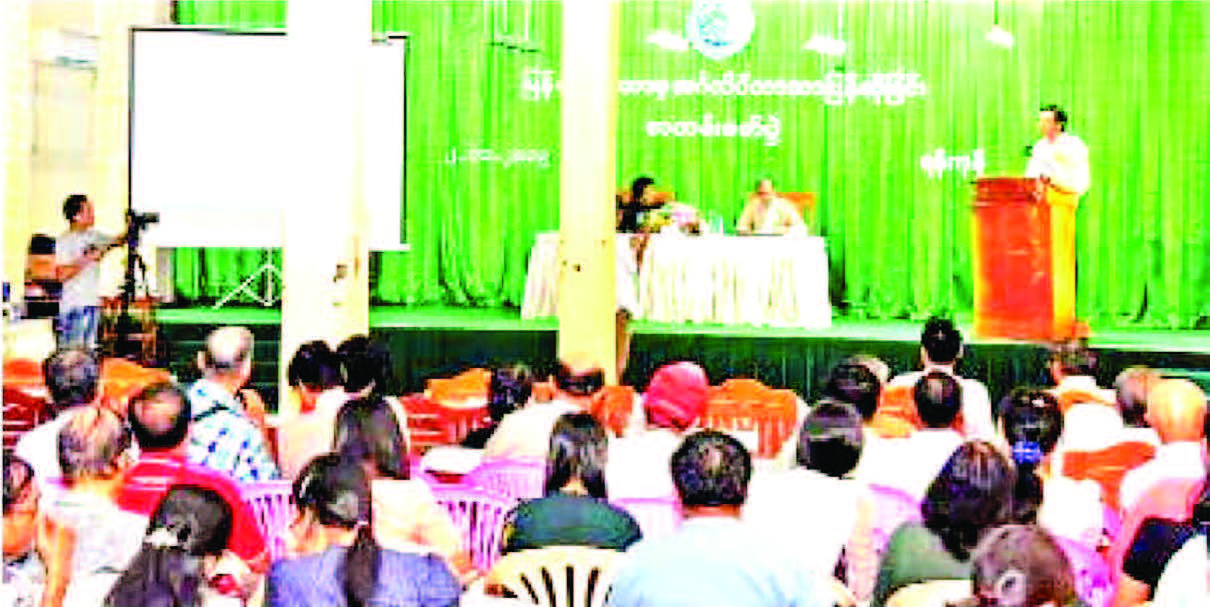By Maung Swe Ngae
Myanmar Literature is a repository of historical records that bequeath art and social events of the nation and its people. It assumes the form of the soul of the country. It also serves as an essential and effective pivot of communication for the promotion of national interests. The progress and diminution of the interests of a nation depend much upon the literary standard of that nation.
It is for this reason that successive governments take up the duty of continued preservation of the literary heritage. No one can deny that Myanmar Literature has been provided with a solid foundation since the Bagan period. According to the historical records, we roughly know that Myanmar novels began to turn up in 1904; Myanmar magazines started to come out around 1910; and newspapers (in Myanmar) began to appear in or around 1875.
In this way, successive governments have carried out literary development activities in one way or another. Historically speaking, there were such periods as Tagaung, Pyu, Bagan, Pinya, Innwa, Taungoo, Nyaungyan and Konbaung under Myanmar monarchs. After the exile of King Thibaw, we saw the colony period and Japanese occupation. They were followed by the post-independence period (known as the AFPFL Government or Parliament Era) and the Revolutionary Council period. (Burma Socialist Programme Party Era), the State Law and Order Restoration Council, the State Peace and Development Council period and the Democracy period.
Throughout the past era of Myanmar Kings, Literary development activities flourished in accordance with the conditions of those ages and systems the then prevailed. Although the development process of Myanmar Literature was retarted and neglected in the British time and Japanese occupation, a group of devoted literary men continued the task. From the post-independence period onwards, Sarpay Beikman (Institute), formerly known as Burma Translation Society (BTS), has been playing an important role in carrying out the task of literary development.
Starting essentially as a translation society, Sarpay Beikman has become truly a publishing house with a wide variety of functions. Among them, the objective ‘To hold cultural talks and to exhibit cultural shows regularly during the non-raining period of the year’ is included in the main functions. In order to implement this function, besides the publishing tasks, the institute had to conduct public lectures and talks and hold public classes on different subjects not usually taught in ordinary schools (including universities and colleges) during the Parliament period.
In cooperation with the then Ministry of Union Culture, the institute sponsored talks and shows at the outdoor theatre on the Pyay Road grounds. Often, as many as 1,000 people attended those events, which had become a Friday evening highlight in Rangoon’s (Yangon’s) cultural life. These open-air performances were held weekly from early November until the advent of the monsoon in May.
Such events paved the way for holding paper reading sessions in the present time. Formerly, the paper reading sessions were known as ‘Symposia’ or ‘Literary Seminars’. The papers on both arts and science read out at the paper reading sessions conducted by Sarpay Beikman are quite beneficial not only to the literary world but also to the social life of the people.
The papers dealing with various subjects are reliable for reference as scholars and famous writers compile their papers through research works. According to the records, paper reading sessions on 23 subjects were held under the aegis of the Ministry of Information between 1969 and 1992. After eight years elapsed, the last literary seminar or paper reading session on translation was held on 19 and 20 June 2000 at the Sarpay Beikman Printing Plant on Pyay Road, Yangon, previously known as the historic Sorrento Villa, where the post-war government mapped out national reconstruction and development projects. It was known as the 24th session.
Another five paper reading sessions were held in the Democracy Period. Although they were called seminars or symposia at the outset, from 1947 onwards, scholars came to use the term ‘Paper Reading Session’. The following will serve as something for knowledge: -
1. Seminar on Children’s Literature (1965)
2. Seminar on Science Literature (1967)
3. Seminar on Library Science (1968)
4. Seminar on Translation Literature (1969)
5. Seminar on Literature on Drama (1970)
6. Seminar on Biography (1971)
7. Collective Paper Reading Session on International Books Year (1972)
8. Seminar on Children’s Literature (1973)
9. Paper Reading session on the History of the Fourth Estate (1974)
10. Paper Reading Session on Knowledge Literature (1977)
11. Paper Reading Session on Short Story (1978)
12. Paper Reading Session on Travelogue (1979)
13. Paper Reading Session on Novel (1979)
14. Paper Reading Session on Myanmar Poems (1981)
15. Paper Reading Session on Myanmar Prose (1981)
16. Paper Reading Session on Specific Studies (1983)
17. Paper Reading Session on Reference Books (1984)
18. Paper Reading Session on Literary Criticism (1985)
19. Paper Reading Session on Essay (1986)
20. Paper Reading Session on Translation (1987)
21. Paper Reading Session on Traditional Folk-tales (1987)
22. Paper Reading Session on Classics (1991)
23. Paper Reading Session on Literature for Patriotism (1992)
24. Seminar on Literature for Translation (2000)
25. Paper Reading Session on Political Literature (2016)
26. Paper Reading Session on Contemporary Histories (2016)
27. Paper Reading Session on Translation (2017)
28. Paper Reading Session on Myanmar Art Form, Myanmar Traditions and Myanmar Outlook (2019)
29. Paper Reading Session on Translation (from Myanmar to English) (2019)
All the seminars and paper reading sessions were conducted by Sarpay Beikman except the session on translation (from Myanmar to English) which was held in 2019 and was organized by the Information and Public Relations Department (IPRD) under the Ministry of Information. Each title shall be presented in future.
Reference: -
1. ယမင်း၊ စာပေဗိမာန် စာတမ်းများ တစေ့တစောင်း၊ ရန်ကုန်၊ စာပေ ဗိမာန်၊ ၂၀၀၇ (ပထမအကြိမ်)
2. Maung Swe Ngae, Through the Window of Sarpay Beikman, Yangon, Naing Ngant Gon Yi, 2021



